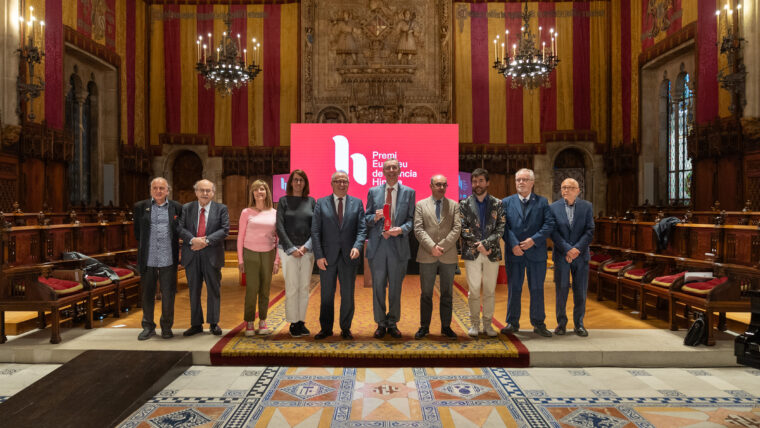Barcelona recognizes the scientific career of Svante Pääbo with the 5th Hypatia Award
His research and outreach work have transformed our understanding of the evolutionary history of humankind.
The Swedish geneticist and biologist Svante Pääbo has been awarded this afternoon with the 5th Hypatia European Science Prize for his groundbreaking research in the field of paleogenomics and his key role in the study of the genomes of extinct human species. The award, endowed with €30,000, is an initiative promoted by the Barcelona City Council, in collaboration with the Barcelona Knowledge Hub of the Academia Europaea. It aims to highlight internationally renowned research and strengthen the city’s position as a European capital of science.
Institutional ceremony at the Saló de Cent
The award ceremony took place during an institutional event held at the Saló de Cent, where the fourth deputy mayor, Jordi Valls, presented the 5th Hypatia European Science Prize to Svante Pääbo. This recognition honors his essential contribution to the study of the genomes of extinct human species and his key role in the development of paleogenomics. His research has enabled the establishment of genetic connections between Homo sapiens and other hominins, offering new perspectives on the evolution of our species.
In his speech, Jordi Valls emphasized Pääbo’s “excellence and talent” as well as the “deep connection” the researcher has with Barcelona, noting that “his collaborations with the Institute of Evolutionary Biology have left a lasting mark”. He also underlined the vital role that science must play in today’s world, stating that “we need science more than ever, and we need to protect science more than ever” in reference to the warning raised by thousands of scientists regarding threats to academic freedom. “In the face of harsh cuts and censorship, Barcelona extends a hand to all scientists who are under threat today” he concluded.
Pääbo expressed his gratitude for the recognition and described it as an “honor” to receive such a distinguished award in a city that has become a “hub of biological sciences” at the European level. During the event, he gave a brief presentation on his scientific career, focusing on the sequencing of the Neanderthal genome and how “these extinct forms of humans still influence us today”.
The ceremony also featured the participation of Don Dingwell, President of the Academia Europaea, and Jaume Bertranpetit, Director of the Barcelona Knowledge Hub. The laudation of the awardee was delivered by Carles Lalueza, Director of Museu de Ciències Naturals and expert in paleogenomics, who collaborated with Pääbo on the Neanderthal Genome Project.
A scientific career that transformed our understanding of human evolution
Svante Pääbo, born in Stockholm in 1955, is internationally recognized as the founder of the field of paleogenomics. In 2013, he successfully sequenced the genome of the Neanderthal for the first time—an extinct species that disappeared around 30,000 years ago and is a direct relative of modern humans. He also led the discovery of the Denisovan, a previously unknown hominin, and demonstrated that significant genetic transfer occurred between these species and Homo sapiens, especially after the migration of modern humans out of Africa some 70,000 years ago. Today, between 1% and 4% of the genome of non-African populations comes from Neanderthals, and this genetic legacy continues to have implications for aspects such as immune response to infections.
This set of discoveries has marked a turning point in our understanding of human evolution and laid the groundwork for exploring the genetic differences that define us as a species. His research opened a new scientific frontier, enabling the analysis of DNA samples dating back hundreds of thousands of years. Pääbo earned his PhD from Uppsala University in 1986, pursued postdoctoral research in Zurich and Berkeley, and served as a professor at the University of Munich. Since 1999, he has been the director of the Max Planck Institute for Evolutionary Anthropology in Leipzig. In 2022, he was awarded the Nobel Prize in Medicine for his scientific achievements.
The Hypatia Award: showcasing european research from Barcelona
The Hypatia European Science Prize was established in 2018 as part of the first Barcelona Science Plan. It is a biennial award that recognizes prominent figures from different scientific disciplines in each edition, with the aim of highlighting European scientific talent and reinforcing Barcelona’s role as a city of science and knowledge. This fifth edition of the award has been dedicated to the Life and Health Sciences, following previous editions that honored figures from the scientific-technological, humanities, and social sciences fields.
Past recipients of the prize include László Lovász (2018), mathematician; Ilaria Capua (2019–2020), virologist; Nancy Cartwright (2021), philosopher of science; and Núria Oliver (2023), expert in artificial intelligence, recognized for her research in developing AI systems with a positive social impact.
The role of the Academia Europaea and the Barcelona Knowledge Hub
The Academia Europaea is an international, non-governmental association that promotes research and education across all fields of knowledge. With over 5,000 members—including more than 80 Nobel Prize laureates—it operates through a network of regional hubs. The Barcelona Knowledge Hub, active since 2013 and currently based at the Fundació Catalana per a la Recerca i la Innovació, serves as the node for the Mediterranean and Southern European regions. Its activities are organized around five key pillars: fostering interdisciplinary scientific dialogue, promoting public engagement, exploring the intersection between science and art, showcasing Catalan research on an international scale, and recognizing academic excellence—such as through the Hypatia European Science Prize.

















